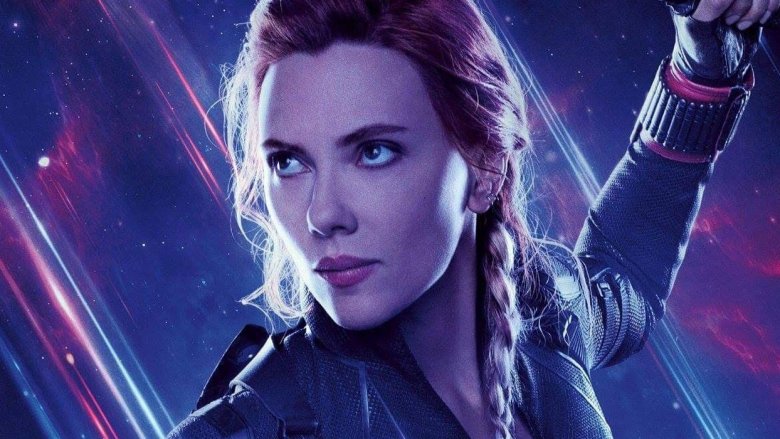Endgame Directors Defend Controversial Black Widow Scene
Avengers: Endgame provided a defining moment for Scarlett Johansson's Black Widow — one which caused a stir among many MCU fans.
In an Entertainment Weekly interview, directors Joe and Anthony Russo felt the need to clarify their thinking in including the scene, which one could hardly argue was out of character for Natasha Romanoff. Be advised that spoilers for Avengers: Endgame follow.
During the Avengers' "Time Heist" — in which separate teams of heroes were sent to different periods of time in order to retrieve the six Infinity Stones long before Thanos could get his grimy, purple hands on them — Romanoff and longtime partner in crime Clint Barton (AKA Hawkeye) were dispatched to the planet Vormir to secure the Soul Stone. The pair were met by the ghostly Red Skull, who informed them that they would have to deal with the same quandary faced by Thanos in Avengers: Infinity War: in order to possess the stone, one must give up that which they love. Realizing the ramifications of the situation, the old friends proceeded to fight to the death — that is, for the right to be the one to go over the cliff, making the ultimate sacrifice so that the other might complete the mission.
In the end, the Black Widow emerged victorious (in a manner of speaking), and plunged to her doom, leaving Hawkeye in possession of the stone and faced with the unenviable task of returning to the present day to inform the Avengers that Romanoff was no more. It was a sacrifice only fitting for a character who had a lot of red in her ledger, and was driven by a need to wipe it out — but some fans saw it as an unfortunate example of "fridging," a trope in which a female character's death is used to drive the motivations of male characters. (Oddly enough, the trope gets its name from an issue of Green Lantern, in which Kyle Rayner literally discovers his deceased girlfriend stuffed into his refrigerator.)
In their interview, the Russos defended their decision by bringing up multiple points — first and foremost, the fact that in an all-out brawl between Black Widow and Hawkeye, the eventual victor would necessarily be determined not just by who wanted it the most, but by who was the most skilled. "It's a fight to see who's going to kill themselves," explained Joe Russo. "It's a crazy concept for a scene. And as you've seen in The Avengers, she's a better fighter than he is. So when it comes down to a fight between the two of them, she wins."
But that was far from the only factor. In defending their choice (and, by extension, Romanoff's), the directors explained that in essence, Romanoff was motivated by her desire to see her friend redeem himself after his stint as the bloodthirsty Ronin, and reunite with his lost family (who had all been dusted in the Decimation). "We open the movie on [Hawkeye's] family," Anthony Russo said. "She reminds him of it in the scene. They both may have the mission in that moment where [they're saying], 'I'm not going to let you kill yourself,' but Hawkeye has mixed agendas there, which I feel takes the edge off his focus in a way that [doesn't apply to Romanoff]."
Joe Russo continued to relate that Widow's choice plays into the larger theme of Endgame, which is the mirror opposite of that explored in Avengers: Infinity War. "The theme of the movie is, can you change your destiny, and what does it cost to do it? And are you willing to pay that cost? It's a resounding yes from the Avengers. In [Infinity War], they said, 'We don't trade lives,' and there was a desire to protect. And in this movie, there's now a desire to sacrifice in order to accomplish the goal."
The director continued to say that this specific theme of sacrifice was appropriate to Romanoff's character arc, going from a mercenary-style loner to a full-fledged protector who sees her survival as being secondary to the goal of the Avengers — the only real family she's ever known — to save the universe itself from untold destruction. "I think that that's a natural progression, right?" he said. "'Well, the first thing we're going to do is try to protect everybody.' And then when you realize it can't work that way, then true heroes step up and are willing to sacrifice for the greater good."
It's an idea explored in multiple Marvel Cinematic Universe offerings, from Steve Rogers' willingness to face certain death at the conclusion of Captain America: The First Avenger to the Vision's insistence on sacrificing himself so that Thanos would be thwarted in his attempt to possess the Mind Stone in Infinity War. And in regard to the fate of the Black Widow, we find her decision to be the perfect conclusion to the arc of a character that, in being part of the glue that has held the MCU together since her introduction in 2010's Iron Man 2, has seen a distinct shift in her morality and the things that she deems to be of the most importance. We always figured that if she were to go down, she'd go down fighting, and she did — not against the forces of evil, but against her most beloved ally, for the right to be the one to die so that the other might be able to live in peace for perhaps the first time.
